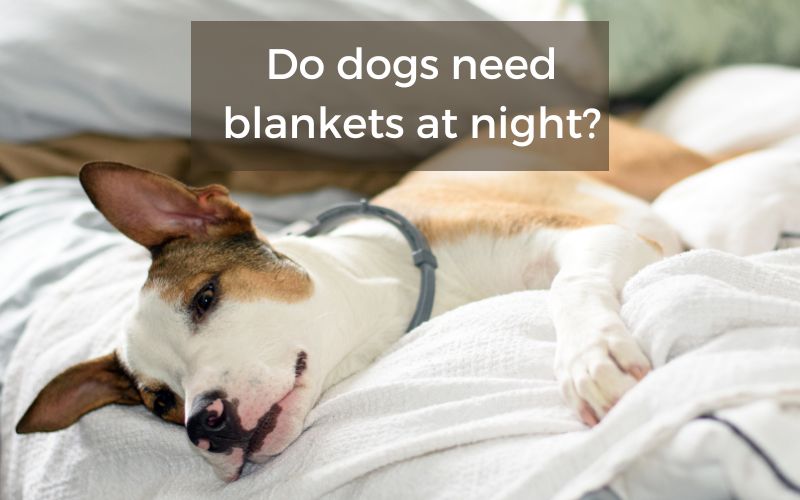When the temperatures start to drop at night, you may find yourself reaching for a blanket to keep warm. But what about your dog?
Do dogs need blankets at night? The short answer is that it depends on the dog.
Dogs with short fur coats are more susceptible to the cold than dogs with thick, furry coats. If your dog has short fur, she may benefit from having a blanket at night. This will help her stay warm and comfortable throughout the night.
Ill and older dogs may also need blankets
Just like humans, as dogs age they may need a little extra help staying warm at night.
This is because older dogs tend to have a lower metabolism and decreased muscle mass, which means they don’t retain heat as well as they used to.
Additionally, many senior dogs suffer from health conditions that can make it difficult for them to keep warm.
Dogs who are elderly or have health problems may also benefit from sleeping with a blanket.
Older dogs tend to have a harder time regulating their body temperature, so a blanket can help them stay warm.
Dogs with health problems may also benefit from an extra layer of warmth at night.
If your dog falls into either of these categories, consider using a blanket to help her stay comfortable during the colder months.

Signs your dog may need a blanket
If you notice your older dog shivering, this is a sure sign that he or she is having trouble staying warm.
Other signs to look out for include:
Hiding under furniture or in other small spaces
Sleeping more often or for longer periods of time than usual
Refusing to go outside or take walks
Moving more slowly than usual
Exhibiting general signs of discomfort or pain
Popular dog blankets
Keep in mind these health conditions
In addition to age-related changes, there are certain health conditions that can make it difficult for your dog to stay warm at night.
These include:
Arthritis: This condition can make it painful for your dog to move, which can lead to decreased activity and muscle loss. Arthritic dogs may also have difficulty getting into and out of their bedding.
Kidney disease: Kidney disease affects the dog’s ability to regulate body temperature. Older dogs with kidney disease may need a blanket even when the weather is mild.
Hypothyroidism: This condition results in decreased metabolism, which can make it hard for your dog to stay warm.
Cancer: Cancerous tumors can affect the dog’s ability to regulating body temperature.
Anaemia: Anaemic dogs may need a blanket because anaemia decreases the body’s ability to carry oxygen to the tissues, which can make it harder to stay warm.
Dementia: Dementia can cause disorientation and confusion, which may lead to your dog sleeping more during the day and less at night.
Benefits of providing your dog with blankets at night
Cozy blankets help keep older dogs warm at night.
As we age, our bodies become less efficient at regulating our internal temperature. This means that we tend to feel colder more easily, and older dogs are no exception.
If your senior dog is having trouble staying warm at night, a blanket can make all the difference.
Just be sure to choose a spacious blanket that your dog can curl up in without feeling constricted.
Ill and older dogs may need extra support.
Dogs with health issues often need extra support, both emotional and physical.
A soft, comforting blanket can provide both forms of support for your pet.
The physical support offered by a blanket can help ease your dog’s pain and make them feel more comfortable.
Meanwhile, the emotional support provided by snuggling under a blanket with you can help reduce anxiety and feelings of isolation.
Blankets can help prevent injuries in ill and older dogs.
As our bodies age, we become more prone to injuries—and this is true for dogs as well as humans.
One way to help prevent injuries in ill and older dogs is to use blankets to create a safe environment for them to sleep in.
For example, if your dog is getting frail and is at risk of falling out of bed, you can use blankets to build up the sides of their bed so that they’re less likely to roll out during the night.
What sort of blanket should you use for your dog?
Material
The best material for an older dog’s blanket is wool.
Wool is naturally insulating and will help your dog retain body heat. I
t’s also breathable, so it won’t make your dog too hot.
If you’re worried about wool being scratchy, look for a blanket that’s wool on one side and fleece on the other. This way, your dog can choose which side is more comfortable for them.
Size
When it comes to size, you’ll want to err on the side of too big rather than too small.
A big blanket will give your dog plenty of room to move around and get comfortable.
It will also be less likely to slip off in the middle of the night.
Weight
You might think that a heavier blanket would be more effective at keeping your dog warm, but this isn’t always the case.
A heavy blanket can actually be too hot for an older dog and make them uncomfortable.
A light-weight blanket is usually best.
Final Words
Whether or not your dog needs a blanket at night is ultimately up to you as the owner.
However, if your dog has short fur, is elderly, or has health problems, she may benefit from having a blanket to sleep with.
And finally, some dogs just plain prefer to sleep with a blanket—so if that’s the case with your pup, there’s no harm in letting her snuggle up under one.










